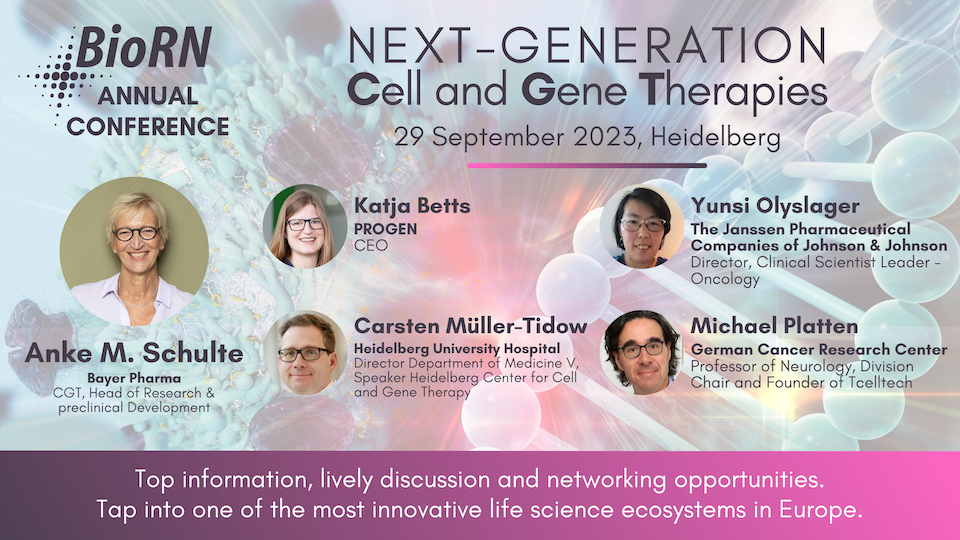
Cell & Gene Therapies: time for celebration?
Six years after the first approved cell and gene therapy, the field is living a renaissance. 5 additional FDA-approved therapies were added in 2022 and could be doubled in 2023, setting a new pace to cell & gene therapies. The BioRN Annual Conference on September 29th in Heidelberg will highlight next-generation approaches in the field.
In the Summer of 2017, the first gene therapy was made available to patients in the United States. A historic action, showing the great potential of this technology to transform medicine. However, a real exponential growth of Cell and Gene Therapy (CGT) and accordingly the access for patients become only recently a reality. Of the currently 27 FDA-approved CGT, four alone were introduced in 2022: three new therapies approved to treat rare diseases and another approved to treat bladder cancer. While these technologies were initially developed to treat rare diseases caused by a single faulty gene, a variety of gene and cell-based therapies for both rare and common diseases are currently in development. 2023 could easily beat those numbers already in summer. 13 new CGTs could soon be approved in the US, Europe, or both.
This year BioRN Annual Conference NEXT-GENERATION Cell & Gene Therapy gathers on September 29 in Heidelberg experts from science and business around this topic, predicting that the future of CGTs is incredibly promising.
Cell and gene therapies hold the potential to revolutionize the treatment of many diseases for which there is currently no cure. Together with our platform companies AskBio and BlueRock Therapeutics, we have developed a pioneering portfolio of CGT technologies at Bayer and aim to bring life-changing therapies to patients as well as become a leader in the field. commented Dr. Jost Reinhard, Head of Cell and Gene Therapies at Bayer.
BlueRock Therapeutics, Bayer´s arm´s length Cell Therapy company, is using iPSCs as a platform to manufacture and replace lost or damaged cells that the body needs to repair itself due to neurological, cardiovascular or immune disorders. Asklepios BioPharmaceutical (AskBio), Bayer´s arm´s length Gene Therapy company, is a pioneer in in vivo gene therapy. AskBio Technology is implemented in several clinical programs addressing devastating diseases as Huntington´s, Parkinson´s, and Congestive Heart Failure.
At the BioRN Annual Conference Anke M Schulte, Head of Research & preclinical Development in CGT at Bayer Pharma will show the commitment of the company in contributing to shift the paradigm from treating symptoms to curing diseases. If there was a way of beating untreatable illnesses, CGT must be the key.
CGT approaches are currently more often applied in other field than rare diseases only. Yunsi Olyslager, Director, Clinical Scientist Leader Oncology at Janssen (Pharmaceutical Companies of Johnson & Johnson) will tell us the story of Cilta-cel, Janssen’s first approved CAR-T therapy for patients living with relapsed/refractory multiple myeloma.
If global innovative networks are essential to scale-up healthcare solutions and generate value for patients, also locally in Heidelberg and the Rhine-Neckar region there is a vibrating CGT community. The newly established Center for Cell and Gene Therapy in Heidelberg confirms the pioneering work in the field of CAR-T Cell Therapy in the University Hospital of Heidelberg (https://www.heidelberg-university-hospital.com/14092018-car-t-cell-therapy-starts-in-germany). Carsten Müller-Tidow (Heidelberg University Hospital, Department of Medicine V, Hematology, Oncology and Rheumatology) will highlight recent development on clinical CGT in the field of hematological malignancies. Michael Platten (Professor of Neurology, Division Chair at the German Cancer Research Center and founder of Tcelltech) will report on a cutting-edge technology enabling rapid identification of patient-specific tumour-killing T cells and their TCR receptors to improve and accelerate personalised cancer treatment.
AAV-based gene therapy represents one of the most promising approaches in the field. In the past year we had several approvals of AAV-based gene therapies. The fast growth of the entire AAV landscape is accompanied by many new findings and approaches leading to constant review and adaption of regulatory guidelines concerning viral based gene therapy. It is a major challenge to keep up with this quick development affecting indispensable comparability and safety concerns.
Katja Betts (CEO of PROGEN) will show how PROGEN can support companies in the gene therapy field, being a small piece but integral part of the puzzle to bring gene therapy safely and quickly to patients (https://www.phacilitate.com/aav-proactively-addressing-the-challenge-while-celebrating-the-highlights/?utm_source=linkedin&utm_medium=social&utm_campaign=progen_q&A&utm_term=post)
With over 2,000 clinical trials happening today in the field, of which 200 in Phase III, it calls for a long-awaited celebration for the success of cell and gene therapies, not only for rare but for common diseases as well. CGT can shift the paradigm from treating symptoms to curing diseases, by get to the root cause of the illness and stop it at its source.
Since 2009, each year the BioRN Annual Conference has been a valuable source of top information, lively discussions and networking opportunities with international experts from different fields of the life sciences. Join the discussion about CGT and tap into this innovative network: September 29 in Heidelberg (https://www.biorn.org/biorn-annual-conference)



 Picture from Ferdinand Stöhr on Unsplash
Picture from Ferdinand Stöhr on Unsplash  Photo from Giulia Bertelli on Unsplash
Photo from Giulia Bertelli on Unsplash